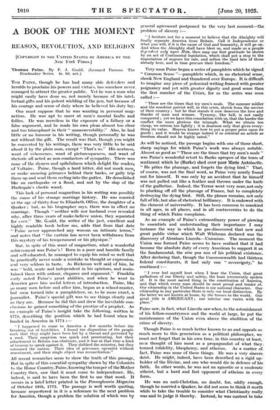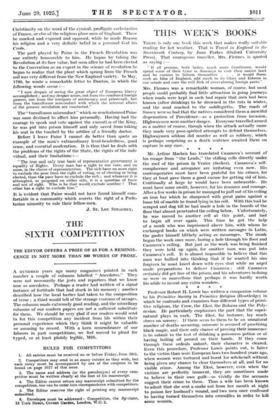A BOOK OF THE MOMENT
REASON, REVOLUTION, AND RELIGION
[COPYRIGHT IN THE UNITED STATES OF AMERICA BY THE
New York Times.] Ton PAINE, though he has had .many able defenders and heralds to.proclaim his powers and virtues, has somehow flex-cr,
managed to attract the greater public. Yet he was a man who might easily have done so, not merely because of his intel-
lectual gifts and his potent wielding of the pen, but because of his courage and sense of duty where he believed his duty lay. One must suppose that he was wanting in personal mag- netism. He was apt to sneer at men's mental faults and follies. He was merciless in the exposure of a fallacy or a
false argument, and he made his own pleas almost too clear and too triumphant in their " unanswerability." Also, he had
little or no humour in his writing, though personally he was not without the gift. The result was that, though you might be converted by his writings, there was very little to be said about it by the plain man, except " That's so." His neatness, want of vehemence, want of picturesqueness, and want of rhetoric all acted as non-conductors of sympathy. There was none of the slyness and spitefulness which delight the readers of Voltaire. Paine, though a hard hitter, did not mock men, or make amusing grimaces behind their backs, or gaily trip them up and send them- reeling into the gutter. He demolished like an earthquake or a flood, and 'not by the slap of the Harlequin'S elastic wand.
This lack of personal magnetism in his writing was possibly the cause of his strange marriage history. He was married at the age of thirty-four to Elizabeth 011ive, the daughter of a Quaker ; but, as his biographer says, there was in effect no marriage. Though " neither wife nor husband ever revealed why, after three years of make-believe union, they separated for ever." Mr. Gould, the writer of the just, excellent and highly readable book before me, adds that from that date " Paine never approached any woman on intimate terms," and notes that " the curtain has never been withdrawn from this mystery of his temperament or his physique."
But, in spite of this want of magnetism, what a wonderful achievement was Paine's ! Born in a poor and humble family
and self-educated, he managed to equip his mind so well that he practically never made a mistake in thought or expression, and very seldom in taste. As Rickman well said of him, he was bold, acute and independent in his opinions, and main- tained them with ardour, elegance and argument." Franklin early noted Paine's great abilities, and when he went to America gave him useful letters of introduction. Paine, like so ninny men before and after him, began as a school-master, but soon turned into a pamphleteer, or, to be more exact, a journalist. Paine's special gift was to see things clearly and
as they are. Because he did this and drew the inevitable con- clusions he gained something of the prestige of a prophet. As
an example of Paine's insight take the following, written in 1778, describing the position which he had found when he landed in America in 1774 :-
" I happened to come to America a few months before the breaking out of hostilities. I found the disposition of the people such that they might have been led by a thread and governed by a reed. Their suspicion was quick and penetrating, but their attachment to Britain was obstinate, and it was at that time a kind of treason to speak against it. They disliked the ministry, but they esteemed the nation. Their idea of grievance operated without resentment, and their single object was reconciliation."
All recent researches seem to show the truth of this passage. But in spite of this essential sympathy shown by the Colonists to the Mine Country, Paine, knowing the temper of the Mother Country then, saw that it must come to independence. He, indeed, is said to have been the first to use that word. It occurs in a brief letter printed in the Pennsylvania Magazine
of October 18th, 1775. The passage is well worth quoting, because sequestered in it is a reference to the next problem
for America, though a problem the solution of which was by
general agreement postponed to the very last moment—the. problem of slavery :—
" I hesitate not for a moment to believe that the Almighty will finally separate America from Britain. Call it Independence or what you will, if it is the cause of God and humanity, it will go on.' And when the Almighty shall have blest us, and made us a people depmdent only upon Hint, then may our first gratitude be shown by an act of Continental legislation, which shall put a stop to the importation of negroes for sale, and soften the hard fate of those already here, and in time procure their freedom."
Very soon Paine began a series of pamphlets which he signed " Common Sense "—pamphlets which, in no rhetorical sense, shook New England and thundered over Europe. It is difficult to imagine any piece of polemical writing framed with greater poignancy and yet with greater dignity and good sense than the first number of the Crisis, for so the series was soon called :— " These are the times that try men's souls. The summer soldier and the sunshine patriot will, in this crisis, shrink from the service of their country ; but he that stands it now deserves the love and thanks of man and woman. Tyranny, like hell, is not easily. conquered ; yet we have this consolation with us, that the harder the conflict the more glorious the triumph. What we obtain too cheap, we esteem too lightly ; it is dearness only that gives every- thing its value. Heaven knows how to put a proper price upon its goods ; and it would be strange indeed if so celestial an article as freedom should not be highly rated."
As will be noticed, the passage begins with one of those short, sharp sayings for which Paine's work was always notable. Almost as good as " These are the times that try men's souls " was Paine's wonderful retort to Burke apropos of the tears of sentiment which he (Burke) shed over poor Marie Antoinette. " He pities the plumage, and forgets the dying bird." That,' of course, was not the final word, as Paine very nearly found out for himself. It was only by an accident that he himself was not pulled out like a feather and thrown under the knife of the guillotine. Indeed, the Terror went very near, not only to plucking off all the plumage of France, but to completely destroying the dying bird. Still, the phrase remains, not only full of life, but also of rhetorical brilliancy. It is endowed with the element of universality. It has been common to mankind in all ages, in all places, and in all controversies to do the thing of which Paine complains.
As an example of Paine's extraordinary power of piercing to essentials and understanding their importance I may instance the way in which he pre-discovered that new and great public virtue which Walt Whitman declared was the discovery of Abraham Lincoln—Unionism. The moment the Union was formed Paine seems to have realized that it had become the absolute duty of every American to support it as the fundamental, the sine qua non of his political existence. After declaring that, though the Commonwealth had thirteen federal constituents, it had only one " sovereignty," he continued :— " I ever feel myself hurt when I hear the Union, that great palladium of our liberty and safety, the least irreverently spoken of. It is the most sacred thing in the constitution of America. and that which every man should be most proud and tender of. Our citizenship in the United States is our national character. Our, citizenship in any particular State is only our local distinction. By, the latter we are known at home, by the former to the world. Our. great title is AMERICANS ; our inferior one varies with the place."
Paine saw, in fact, what Lincoln saw when, to the astonishment of his fellow-countrymen and the world at large, he put the maintenance of the Union even above the abolition of the crime of slavery.
Though Paine is so much better known to us and appeals so much more to this generation as a political philosopher, we must not forget that in his own time, in this country at least,' mtn thought of him most as a propagandist of what they1 termed infidelity, blasphemy, and atheism. As a matter of fact, Paine was none of these things. He was a very sincere, deist. He might, indeed, have been described as a rigid up- holder of the Divine, and one who would die in defence of his faith. In other words, he was not an agnostic or a moderate' atheist, but a hard and fast opponent of atheism in every form.
He was an anti-Christian, no doubt, for, oddly enough, though he married a Quaker, he did not seem to think it worth while to take the trouble to consider what Christianity really, was and to judge it thereby. Instead, he was content to take
Christianity on the word of the cynical, profligate ecclesiastics of France, or else of the religious place men of England. These he mocked and exposed and opposed, while he made Reason his religion and a very definite belief in a personal God his Credo.
The part played by Paine in the French Revolution was one entirely honourable to him. He began by taking the Revolution at its face value, but soon after he had been elected to the Convention as an expert in the science of revolution he began to realize that the plant which sprang from the French soil was very different from the New England variety. In May, 1793, he wrote a remarkable letter to Danton, in which the following words occur :-
" I now despair of seeing the great object of European liberty accomplished ; and my despair arises, not from the combined foreign powers, not from the intrigues of aristocracy and priestcraft, but from the tumultuous misconduct with which the internal affairs of the present revolution are conducted."
The" tumultuous misconduct" which so much alarmed Paine was soon destined to affect him pers.onally. Having had the.
courage to speak and vote against the executim of the King, he was put into prison himself and only saved from taking his seat in the tumbril by the artifice of a friendly doctor.
Before I leave Paine I cannot do better than quote an example of the man's extraordinary level-headedness, good sense, and essential moderation. It is thus that he deals with the piobleins of the rights of the State, the rights of the indi- vidual, and their limitations :-
" The true and only true basis of representative government is equality 'of Rights. Every man has a right to one vote, and no more, in the choice of representatives. The rich have no more right to exclude the poor from the right of voting, or of electing or being elected, than the poor have to exclude the rich ; and wherever it is attempted, or proposed on either side, it is a question of force and not of right. Who is he that would, exclude another ? That other has a right to exclude him."
It is evident that Paine 'would not have found himself com- ifortable in a community which asserts the right. of a Prole- tarian minority to rule their fellow-men.
J. ST. LOE STRACHEY.











































 Previous page
Previous page